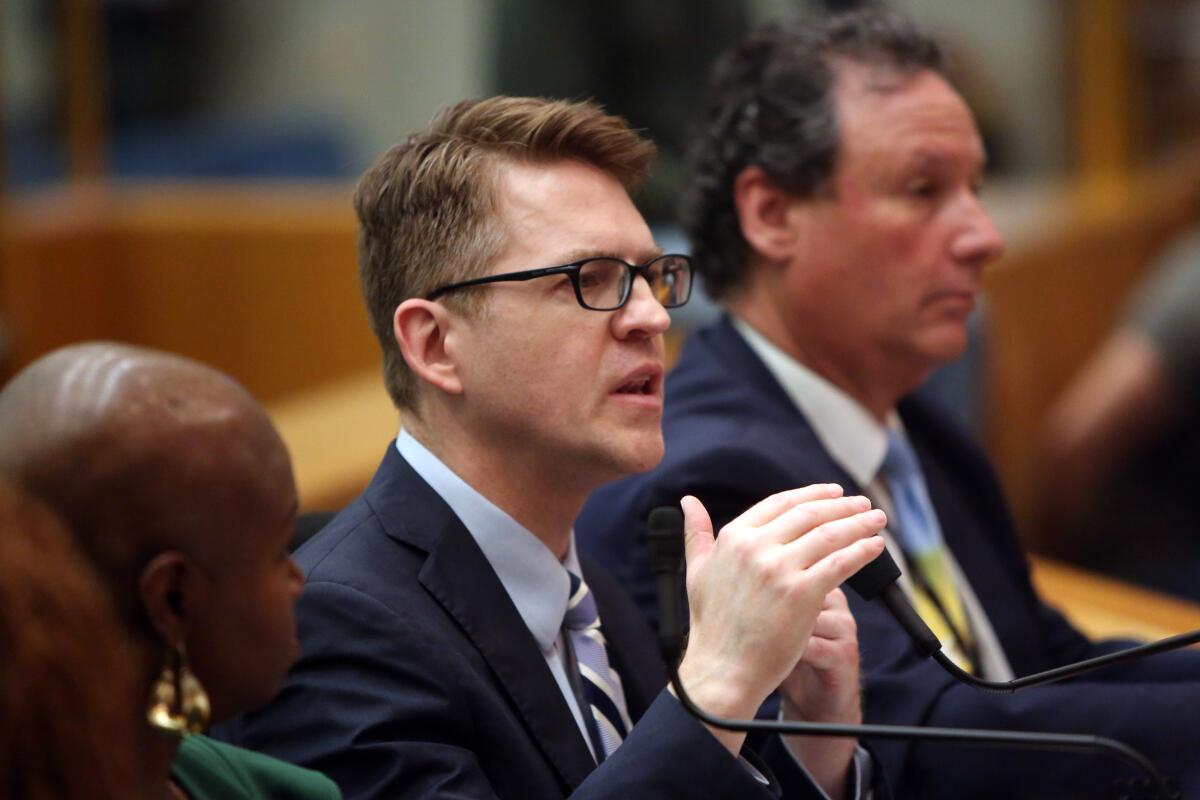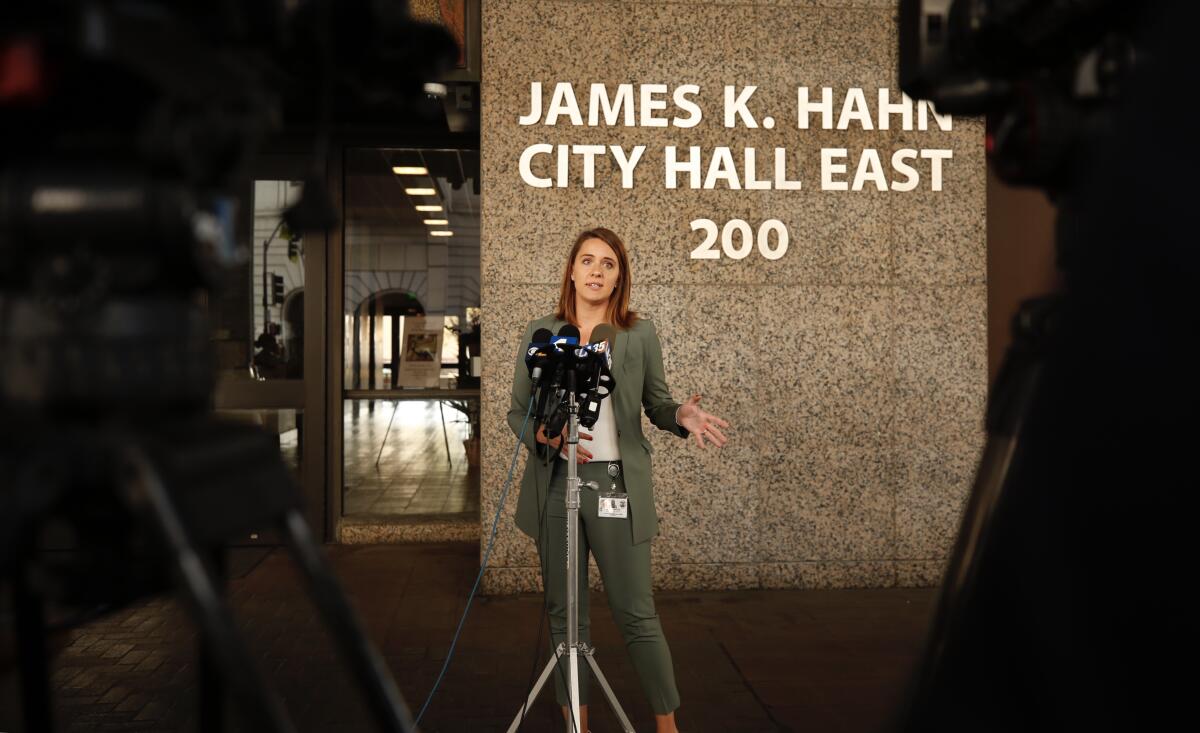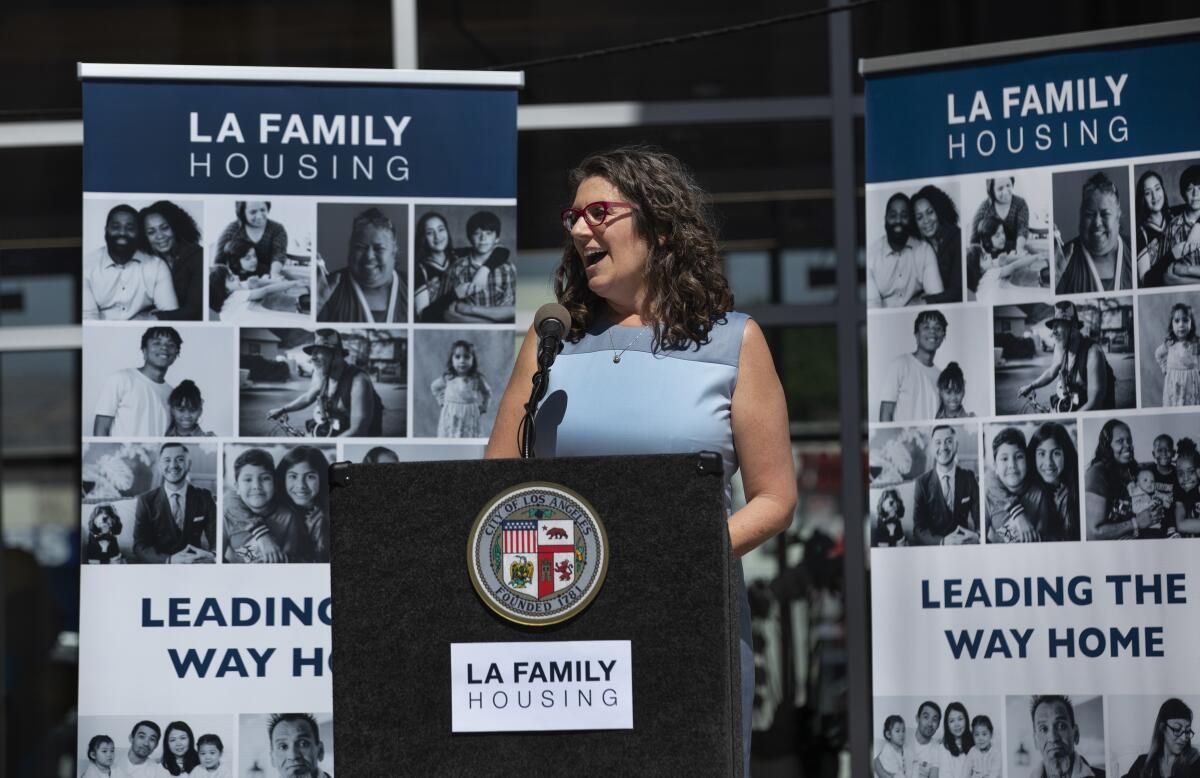Leader of L.A.’s top homeless agency quits after a ‘long five years,’ rising public anger

In a major change for the team tasked with addressing rising homelessness in the region, Peter Lynn announced Monday that he is stepping down as head of the Los Angeles Homeless Services Authority.
Chief Program Officer Heidi Marston will fill in as interim director during a national search for a replacement when Lynn officially leaves at the end of this month.

“Boy, these have felt like some long five years,” he said in an interview last week. “I mean I have really enjoyed this, this role and this gig and I have also felt quite a lot of wear and tear from it.”
Lynn has long been the face of bad news on the homelessness crisis in Los Angeles. As executive director of the city-county agency that conducts the count of those without permanent shelter, he presented the results to elected officials and the public each year.
Homelessness has increased a total of 33% during Lynn’s tenure, precipitating a public reaction that has produced millions of dollars of new tax revenue but also growing frustration with the lack of visible results.
Lynn told The Times that his decision to leave the $242,000-a-year job was partly motivated by a nearly two-month medical absence after an August auto accident left him with a debilitating concussion. The time away allowed him to see things from a new perspective, he said.

Stephanie Klasky-Gamer, president and chief executive of LA Family Housing, a services provider and homeless housing developer, said she is “really disappointed” that Lynn is resigning.
“I totally appreciate and understand why he is making a decision to step down. It is a really challenging position to be in,” she said. “He’s never lost sight of the humanity of why we were doing our work.”
Elise Buik, president and chief executive officer of United Way of Greater Los Angeles, said Lynn “has dedicated his life to this work, and L.A. County is a better place because of it.”
He led the effort to “build up the coordinated and integrated approach we’ve always needed,” she said. “He also helped drive the conversation about how racism is intertwined with homelessness, and he elevated our housing affordability crisis as the key headwind that we face.”
In Lynn’s most recent presentation to announce the 12% countywide increase in homelessness in 2019, for instance, he took pains to explain that even as shelter and housing programs were taking thousands of people off the streets, a crisis of housing affordability was pushing even more out of their homes.
Lynn said he has been trying to shift the public conversation from the “personal characteristics of the people who are homeless ... to structural factors, like housing affordability, like lack of access to mental health, like lack of access to substance use treatment.”
Despite that, Lynn said he primarily considered himself an administrator. In a non-political job atop an agency created in 1993 by Los Angeles city and county to manage mostly federal homeless funds, his biggest challenge was pulling together a homeless services system sprawling across the county and 88 city governments.
Elected officials complimented Lynn’s work on homelessness and acknowledged the challenge of this post.

“Peter’s leadership of LAHSA came at a time when Angelenos took historic action and made generational investments in confronting the homelessness crisis,” Los Angeles Mayor Eric Garcetti said in a statement. “He served for five years, with dedication, in one of the toughest jobs — and I thank him for all he did to bring more resources to our most vulnerable neighbors.”
County Supervisor Janice Hahn echoed this sentiment.
“Peter led LAHSA through an historic expansion, from a relatively small agency managing shelters, to a multimillion-dollar organization implementing both the county and cities’ homelessness strategies,” she said in a statement. “He welcomed the challenge and his leadership of the agency was important, necessary and appreciated.”
Some officials, though, say this is an opportune moment to rethink the structure of this agency in an effort to give it more power over things like land use and policy planning.
“I believe it is time for LAHSA to take a very different direction,” L.A. City Councilman Paul Krekorian said Monday. “If that can be achieved through dynamic new leadership, so be it. If instead it must be done through extensive restructuring of the agency, then this is the time to do it.”
The chair of the authority’s commission, Sarah Dusseault, who was appointed this past summer, recently told The Times that she thinks it’s time to start considering how to create an entity where the lines of authority are more clearly delineated.
Lynn took the job in December 2014, after serving as Section 8 administrator with the Los Angeles Housing Authority. He inherited a nascent project called the “coordinated entry system,” which was designed to match people on the street with appropriate shelter or housing as it became available.
That system, developed by United Way as a pilot program, had to be expanded to work with hundreds of homeless and housing agencies across the county. In 2015, under Lynn’s leadership, the homeless services authority produced its first data analysis projecting how many housing units and shelter beds would be needed to serve the county’s homeless population — then about 44,000 people.
That data analysis provided the foundation for two local tax measures. In 2016, Los Angeles city voters approved Proposition HHH to authorize $1.2 billion in housing construction bonds, and in 2017, county voters approved Measure H, a sales tax increase for homeless services.
The resulting flood of new money put Lynn in the unusual position of needing to more than triple his staff as the homeless authority hired hundreds of outreach workers, contract administrators and data analysts.
“I don’t think any of us would have expected in December of 2014 that we would have this enormous support from the voters to turn out and put these resources behind these initiatives,” he said.
Lynn said he plans to stay in the homeless field, but would like to be involved in initiatives that he sees as crucial but beyond the scope of the agency, among them mental illness and substance abuse treatment, as well as reentry programs.
“I think America, in general, provides really poor funding ... for mental health, substance use treatment,” he said. “And I will say, people are really suffering for that.”
He said he also plans to advocate for new housing models to address affordability.
“To the extent that we cannot get deep subsidies,” Lynn said, “we need to think about housing stock types that will be deeply affordable.”
More to Read
Sign up for Essential California
The most important California stories and recommendations in your inbox every morning.
You may occasionally receive promotional content from the Los Angeles Times.












